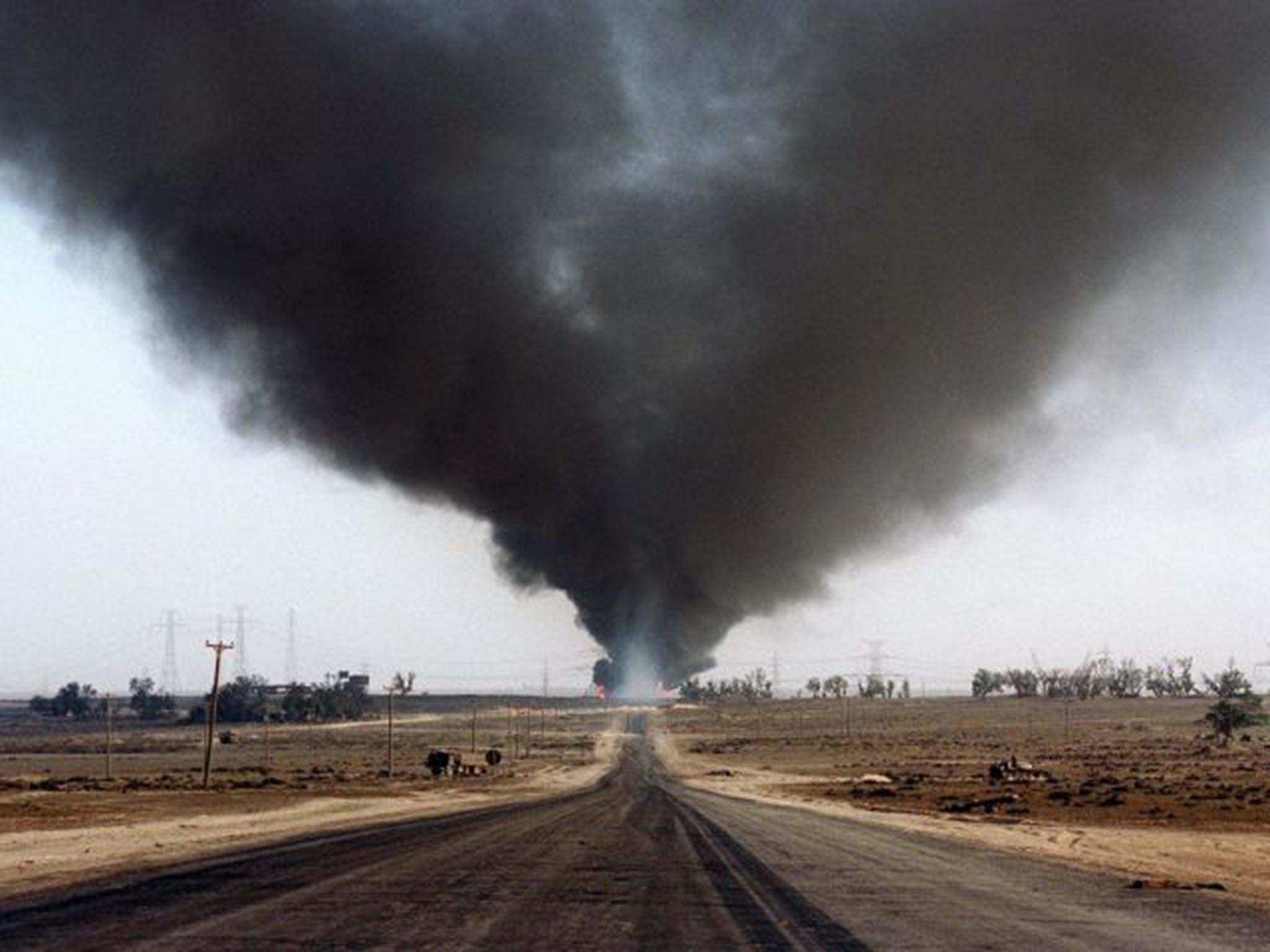The First Gulf War was a great success, but its unintended legacy disastrous for the Middle East – and the world as a whole
Out of America: Since 1991, the region has been turned on its head: by the 9/11 attacks and the growth of non-state militant Islam; by the Arab Spring, unspeakable tragedy in Syria, and the possibility of a generalised Sunni-Shia conflict


How straightforward, how unreal, it all seems now – 25 years on. At 3am Baghdad time on 17 January 1991, the first President Bush unleashed Operation Desert Storm to drive Saddam Hussein’s forces from Kuwait. If only everything today were as simple in the Middle East.
Desert Storm began with a bombing campaign that devastated Iraq’s infrastructure and military supply lines. Then came a ground war that lasted 100 hours, in which a vast international coalition led by 500,000 US troops routed the world’s fourth largest army. The US lost 146 men, 35 of them to friendly fire. On 28 February, Bush announced a ceasefire. America’s goal had been achieved. Kuwait was liberated.
The First Gulf War, it seemed then, was a model of its kind, built upon painstaking and skilful diplomacy, legitimised by an unequivocal resolution of the UN Security Council, and perfectly executed. The goal was circumscribed and clear; there would be no advance to Baghdad, and no US takeover of Iraq such as the one that would happen, with baneful consequences, a dozen years later. In other ways, too, the war was a landmark. It was held to have banished “Vietnam syndrome”, whereby the US supposedly had no stomach for foreign conflicts. It ushered in a fresh era of public veneration for the military that persists, outwardly at least, to this day.
In “Stormin’ ” Norman Schwarzkopf, it produced America’s most charismatic military commander since the Second World War and it was also the first television war, where you could watch Cruise missile launches and strikes as they happened. And, mirabile dictu, thanks to financial contributions from grateful allies such as Kuwait and Saudi Arabia, it damn near turned a profit.
That was then. Today, filtered through the subsequent turmoil in the Middle East, the war takes on a different hue. Since 1991, the region has been turned on its head: by the 9/11 attacks and the growth of non-state militant Islam; by the younger Bush’s invasion of Iraq in 2003; and by the Arab Spring, with its sad, unintended legacy of a collapsed Libya, an even more repressive military regime in Egypt, unspeakable tragedy in Syria, and the possibility of a generalised Sunni-Shia conflict across the region.
The First Gulf War still ranks as a success. But seen from a modern vantage point, it is an anomaly: a conflict between states, fought by organised land armies. Bush Snr, who had fought in the Second World War, saw Saddam as a new Hitler, out to seize an empire of oil – first Kuwait, then Saudi Arabia, then who knew where. The First Gulf War happened 25 years ago. It feels like a century.
Nor was it perfect. In retrospect, costly mistakes were clearly made that have contributed to today’s chaos in the region. One reason Bush Snr didn’t march on Baghdad was that he thought Iraqis themselves would take care of their humiliated leader. But, instead, Bush’s son finished the job, with disastrous consequences.
There were other errors: the lack of a “USS Missouri moment” – a surrender ceremony inflicted upon Saddam akin to that in 1945 of the Japanese government – even though the famous old battleship was on war duty in the Gulf, and could easily have been used to make a devastating symbolic point.
Instead, neither Saddam nor his foreign minister, Tariq Aziz, was summoned to the ceasefire signing that was attended by Schwarzkopf and a couple of Iraqi generals. The latter asked to be allowed to use helicopters, saying they were vital for communications. Schwarzkopf agreed – only for the helicopters to be used in southern Iraq to suppress brutally the Shia Marsh Arabs, whom Bush had encouraged to rise up against Saddam. That perceived betrayal would not quickly be forgotten.
The US had tilted towards Sunni-controlled Iraq in the Iran-Iraq conflict, but the First Gulf War represented Washington’s debut direct military foray into the region’s sectarian politics. It has never really got out since. The dazzling triumph of American arms may have exorcised Vietnam’s ghosts, but it led to a belief that US power was irresistible, and the hubris that helped bring about the blunder of 2003.
Inevitably, the two wars are compared: the father’s “good” war of necessity, to stamp out a dictator’s aggression and safeguard the world’s oil, versus the son’s vengeful “war of choice” based on bad, if not doctored, intelligence and a naive belief that Jeffersonian democracy would take root on the banks of the Euphrates and Tigris.
In fact, they have a critical element in common: the contrast between the battlefield, where on each occasion the US swept all before it, and the aftermath of battle, which the country was far less prepared to handle. Military victories are one thing, satisfactory political outcomes quite another. Barack Obama, so reluctant to commit “boots on the ground” in Syria, has taken the lesson to heart.
In retrospect, you can argue that Bush Snr formally ended his war too soon, instead of waiting a little while to see how the dust would settle. As for Bush Jnr, he would have done better to accept that, for all Saddam’s post-1991 antics, no-fly zones and sanctions meant that the dictator was in his proverbial box. It wasn’t an ideal situation, but one that Washington could have lived with.
And today’s age of terror was partly shaped by that war. The US could not be confronted on the battlefield, Osama bin Laden concluded, but it could be by deadly infiltrators as in 9/11, by a fifth column, or simply by fear. Listen to the apocalyptic rhetoric of the Republican candidates vying to succeed Obama, and Bin Laden surely had a point. America is still the power that can make the biggest difference in the region. But, as the First Gulf War proved, the US can’t save the Middle East from itself.


Join our commenting forum
Join thought-provoking conversations, follow other Independent readers and see their replies